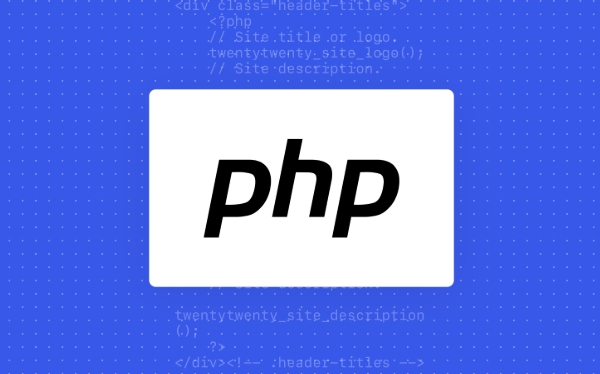 Backend Development
Backend Development
 PHP Tutorial
PHP Tutorial
 Mastering Lexical Scoping: The `use` Keyword and PHP Anonymous Functions
Mastering Lexical Scoping: The `use` Keyword and PHP Anonymous Functions
Mastering Lexical Scoping: The `use` Keyword and PHP Anonymous Functions
Jul 25, 2025 am 11:05 AMIn PHP, if you want to use external variables in anonymous functions, you must explicitly import them through the use keyword; 1. Use is used to introduce external variables into the lexical scope of the closure; 2. Pass variables by default by value, and pass them by reference with &$var syntax; 3. Multiple variables can be imported, separated by commas; 4. The value of the variable is captured when the closure is defined, not when it is executed; 5. Each iteration in the loop creates an independent closure copy to ensure that the variable value is captured correctly; therefore, use is a key mechanism to implement the interaction between the closure and the external environment, making the code more flexible and controllable.

In PHP, anonymous functions (also known as closings) are powerful tools for writing concise and flexible code. But when you're working with variables from the outer scope inside an anonymous function, you need to understand lexical scoping —and that's where the use keyword comes in.

Unlike some other languages, PHP doesn't automatically inherit variables from the parent scope into closings. If you want to access a variable from outside an anonymous function, you must explicitly import it using use .
What Is Lexical Scoping in PHP?
Lexical scoping referers to how a language determines which variables are accessible based on where they're defined in the source code. In PHP, anonymous functions do not have access to the parent scope's variables by default.

For example, this will not work:
$factor = 2;
$numbers = [1, 2, 3, 4];
// This will cause an error – $factor is not in scope
$doubled = array_map(function($n) {
return $n * $factor;
}, $numbers); PHP throws a notice because $factor is undefined inside the closure.

To fix this, you must use the use keyword:
$factor = 2;
$numbers = [1, 2, 3, 4];
$doubled = array_map(function($n) use ($factor) {
return $n * $factor;
}, $numbers);
// Results: [2, 4, 6, 8] Now, $factor is imported into the closure's scope and can be used safely.
Using use with Multiple Variables
You can import more than one variable by separating them with commas:
$tax = 1.1;
$shipping = 5;
$total = function($price) use ($tax, $shipping) {
return $price * $tax $shipping;
};
echo $total(100); // 115This keeps your closure self-contained while still leveraging external configuration or context.
Important Behavior: Variables Are Passed by Value by Default
One of the most misunderstood aspects of use is that variables are copied by value , not by reference—unless you explicitly say otherwise.
$count = 0;
$increment = function() use ($count) {
$count ;
};
$increment();
echo $count; // Still 0 The closure gets its own copy of $count , so modifying it inside doesn't affect the original.
To change this, use the & reference operator:
$count = 0;
$increment = function() use (&$count) {
$count ;
};
$increment();
echo $count; // Now it's 1Now the closure works directly with the original variable.
This is useful when building accumulators, counters, or callbacks that need to modify outer state.
Practical Use Cases for use
Configurable Callbacks
function makeMultiplier($factor) { return function($n) use ($factor) { return $n * $factor; }; } $triple = makeMultiplier(3); echo $triple(5); // 15Event Handlers with Context
$logger = new Logger(); $onSave = function($data) use ($logger) { $logger->info("Saved: " . json_encode($data)); };Dynamic Filtering
$minAge = 18; $adults = array_filter($users, function($user) use ($minAge) { return $user['age'] >= $minAge; });
Common Pitfalls and Tips
- Don't overuse references : While
use (&$var)allows mutation, it can make code harder to debug. Prefer returning values when possible. - Avoid using
usewith$thisin object context : Inside a class method, closings can access$thisautomatically as of PHP 5.4. No need touse ($this)—and doing so may cause confusion. - Be cautious with late binding : The value used in
useis captured at the time the closure is defined, not when it's executed.
Example of timing matters:
$closures = [];
for ($i = 0; $i < 3; $i ) {
$closures[] = function() use ($i) {
echo $i;
};
}
// All will print "3" because $i was captured by value after the loop
foreach ($closures as $closure) {
$closure();
} To fix this, you'd need to bind $i per iteration:
for ($i = 0; $i < 3; $i ) {
$closures[] = function() use ($i) {
echo $i;
};
} But since $i is copied each time, this actually works as expected now—each closure gets its own copy of $i at that iteration.
Wait—actually, in this corrected version, yes, each closure captures the current value of $i because it's re-evaluated in each loop body. So output would be 0, 1, 2.
But if you were modifying a single variable across iterations without proper capture, you could run into issues.
Summary
- Use
useto import variables from the parent scope into anonymous functions. - By default, variables are passed by value—use
&$varinuseto pass by reference. - Closures are great for callbacks, filters, and factories when combined with
use. - Be mindful of timing and variable capture, especially in loops.
Mastering lexical scoping with use gives you fine-grained control over how closings interact with their environment—making your PHP code more modular and expressive.
Basically, if you need a variable inside a closure that's defined outside, just use it. Simple, but powerful.
The above is the detailed content of Mastering Lexical Scoping: The `use` Keyword and PHP Anonymous Functions. For more information, please follow other related articles on the PHP Chinese website!

Hot AI Tools

Undress AI Tool
Undress images for free

Undresser.AI Undress
AI-powered app for creating realistic nude photos

AI Clothes Remover
Online AI tool for removing clothes from photos.

Clothoff.io
AI clothes remover

Video Face Swap
Swap faces in any video effortlessly with our completely free AI face swap tool!

Hot Article

Hot Tools

Notepad++7.3.1
Easy-to-use and free code editor

SublimeText3 Chinese version
Chinese version, very easy to use

Zend Studio 13.0.1
Powerful PHP integrated development environment

Dreamweaver CS6
Visual web development tools

SublimeText3 Mac version
God-level code editing software (SublimeText3)
 The Omnipresent Scope: A Practical Guide to PHP's Superglobals
Jul 26, 2025 am 09:47 AM
The Omnipresent Scope: A Practical Guide to PHP's Superglobals
Jul 26, 2025 am 09:47 AM
PHP's hyperglobal variables are always available built-in arrays used to process request data, manage state and obtain server information; 1. When using $_GET, URL parameters need to be type-converted and verified; 2. When receiving form data through $_POST, filtering should be performed with filter_input(); 3. Avoid using $_REQUEST to prevent security vulnerabilities; 4. $_SESSION needs to call session_start() and log in to reset the session ID; 5. When setting $_COOKIE, enable secure, httponly and samesite attributes; 6. The information in $_SERVER cannot be fully trusted and cannot be used for security verification; 7.$_ENV may be
 Navigating the Boundaries: A Deep Dive into Local and Global Scope
Jul 26, 2025 am 09:38 AM
Navigating the Boundaries: A Deep Dive into Local and Global Scope
Jul 26, 2025 am 09:38 AM
Thedifferencebetweenlocalandglobalscopeliesinwherevariablesaredeclaredandaccessible:globalvariablesaredefinedoutsidefunctionsandaccessibleeverywhere,whilelocalvariablesaredeclaredinsidefunctionsandonlyaccessiblewithinthem.1.Globalscopeallowsbroadacce
 Demystifying Global Access: `global` Keyword vs. the `$GLOBALS` Array
Jul 25, 2025 am 05:27 AM
Demystifying Global Access: `global` Keyword vs. the `$GLOBALS` Array
Jul 25, 2025 am 05:27 AM
ThetwomaintoolsforaccessingglobalvariablesinPHParetheglobalkeywordandthe$GLOBALSsuperglobalarray;1)Theglobalkeywordcreatesareferencetoaglobalvariableinsideafunction,allowingdirectaccessandmodification,andifthevariableisundefined,itinitializesitasnull
 Mastering Lexical Scoping: The `use` Keyword and PHP Anonymous Functions
Jul 25, 2025 am 11:05 AM
Mastering Lexical Scoping: The `use` Keyword and PHP Anonymous Functions
Jul 25, 2025 am 11:05 AM
In PHP, if you want to use external variables in anonymous functions, you must explicitly import them through the use keyword; 1. Use is used to introduce external variables into the lexical scope of the closure; 2. Pass variables by default by value, and pass them by reference with &$var syntax; 3. Multiple variables can be imported, separated by commas; 4. The value of the variable is captured when the closure is defined, not when it is executed; 5. Each iteration in the loop creates an independent closure copy to ensure that the variable value is correctly captured; therefore, use is a key mechanism to achieve the interaction between the closure and the external environment, making the code more flexible and controllable.
 The Scope Resolution Order: How PHP Finds Your Variables
Jul 25, 2025 pm 12:14 PM
The Scope Resolution Order: How PHP Finds Your Variables
Jul 25, 2025 pm 12:14 PM
PHPresolvesvariablesinaspecificorder:1.Localscopewithinthecurrentfunction,2.Functionparameters,3.Variablesimportedviauseinclosures,4.Globalscopeonlyifexplicitlydeclaredwithglobaloraccessedthrough$GLOBALS,5.Superglobalslike$_SESSIONand$_POSTwhichareal
 Scope Implications of Generators and the `yield` Keyword
Jul 25, 2025 am 04:45 AM
Scope Implications of Generators and the `yield` Keyword
Jul 25, 2025 am 04:45 AM
Functions using yield will become generators, and when called, they return the generator object instead of being executed immediately; 2. Local variables of the generator will not be destroyed during the yield pause, but will continue to exist with the generator frame until the generator is exhausted or closed; 3. Extended variable life cycle may lead to an increase in memory usage, especially when referring to large objects; 4. When combined with closures, LEGB rules are still followed, but the latebinding problem of looping variables needs to be solved by immediately binding (such as the default parameter value); 5. .close() should be called explicitly to ensure that finally block execution is performed to avoid delays in resource cleaning. The generator affects memory and behavior by extending the survival time of variables, but does not change the lexical scope rules.
 Why Your Variables Disappear: A Practical Guide to Scope Puzzles
Jul 24, 2025 pm 07:37 PM
Why Your Variables Disappear: A Practical Guide to Scope Puzzles
Jul 24, 2025 pm 07:37 PM
Variablesdisappearduetoscoperules—wherethey’redeclareddetermineswheretheycanbeaccessed;2.Accidentalglobalcreationoccurswhenomittingvar/let/const,whilestrictmodepreventsthisbythrowingerrors;3.Blockscopeconfusionarisesbecausevarisfunction-scoped,unlike
 The `global` Keyword: A Double-Edged Sword in PHP Scope Management
Jul 25, 2025 pm 05:37 PM
The `global` Keyword: A Double-Edged Sword in PHP Scope Management
Jul 25, 2025 pm 05:37 PM
TheglobalkeywordinPHPallowsfunctionstoaccessvariablesfromtheglobalscope,butitshouldbeusedsparinglyduetosignificantdrawbacks.1)Itenablesquickaccesstoconfigurationvaluesinsmallorlegacyscripts.2)ItfitsproceduralcodebaseslikeolderWordPresspluginswheredep





